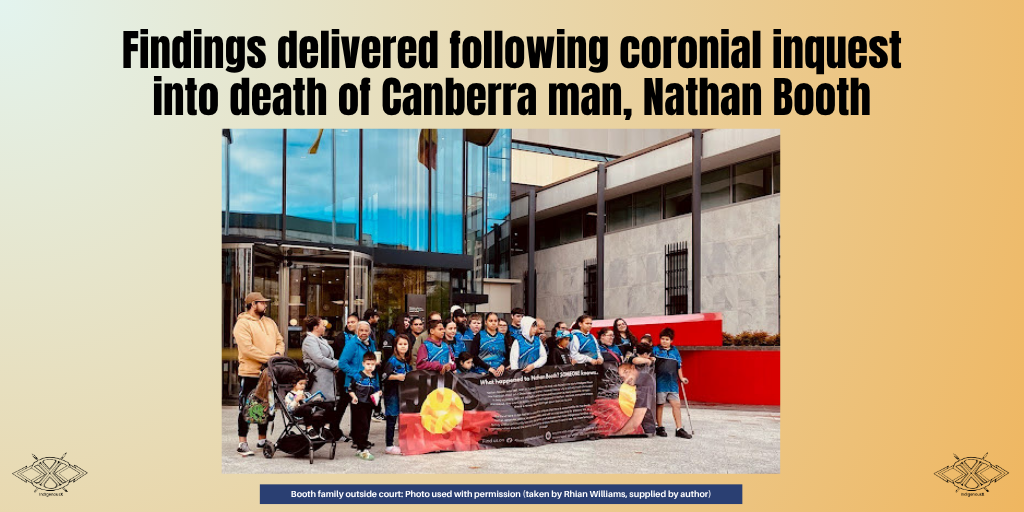Findings delivered following coronial inquest into death of Canberra man, Nathan Booth

Disclaimer: Readers please be advised this contains the name of an Aboriginal Person who has died. His name is used here with the permission of his family.
In 2019, Nathan Booth was reported missing by his family to ACT Police. Three months later, his body was found on the Murrumbidgee River. What followed was an incredible fight by his family to not only find the truth of what happened to Nathan, but a fight to give hope to other Aboriginal families in Canberra who might be told that their loved one’s death was simply a result of ‘misadventure’.
The Booth family, led by Nathan’s sister Deanne, fought tirelessly to have the circumstances of Nathan’s death investigated by the Coroner. After the original Coroner ruled his death ‘misadventure’ in 2020, the family spent the next five years pushing to have the original finding overturned, and for Nathan’s death to be reinvestigated. On Wednesday, 30th of April 2025, Coroner Archer delivered an ‘Open Finding’ – this means the Coroner could say when and where Nathan died, and the medical reason for his death, but not how he came to be there, and the circumstances of his death. Nathan’s death has now been referred back to the ACT Police Homicide team.
This outcome was met with applause. Nathan’s family stand firm in their belief that his death was not the result of an accident, or misadventure, and this finding by the Coroner allows his death to continue to be investigated.
Following the findings, Deanne Booth released the following statement to family and friends:
‘Today in court, we successfully overturned the original ruling of misadventure. It’s now been changed to an open finding, because the coroner could not determine the cause and manner of death. While the coroner isn’t saying it was murder, it now falls under the category of homicide. And that matters—it’s a significant shift. Our family is incredibly proud and relieved. This wasn’t easy. It took strength, time, and unity to get here, but we can finally say: we did it.
We’ve overturned a ruling, and that’s something very hard to achieve. It’s a huge outcome—not just for our family, but for our whole community and all Aboriginal families across Australia . While there’s sadness, there’s also power and pride in this result. To all my family who were there, stayed involved, and pushed through every step: I’m beyond proud of you all. We made this happen—together.’
The overturning of the original finding is a huge achievement. Throughout this entire process, Deanne Booth has been strong in her belief that this achievement may give hope to other Aboriginal families who are faced with the bureaucracy of the coronial system. The Booth family are not legal experts or coronial professionals – they are a family who knew something wasn’t right and who fought to see an unjust ruling overturned.
Their fight could change things for Aboriginal families in the ACT who are forced to experience the coronial system following the death of a loved one. The Booth family were the first Aboriginal family to have their loved one’s inquest heard in the Galambany Circle Sentencing Court, a court allowing the family to sit at the same table as the Coroner. Galambany means ‘we all, including you’ (Ngunnawal). The inquest into Nathan’s death allowed for closer examination of the ways restorative justice principles operate in the coronial jurisdiction, and the ways that they weren’t.
At every step of the way, Coroner Archer involved the Booth family in decision making processes about the inquest and how it might proceed. The Coroner ensured that photos of Nathan could fill the court, and made it possible for members of the family and community to be present at the court, and to participate wherever possible. In his findings, the Coroner noted that there is currently no coronial Practice Direction that guides coroners in the ACT as to how an inquest into the death of an Aboriginal person should be conducted. This in itself will hopefully lead to further changes, improving the experiences of those who navigate coronial processes in the future. In so many ways, the determination of Deanne Booth and her family to see justice for their brother, their son, their father, their cousin, will create a legacy of change for all Aboriginal families in the ACT.
For the Booth family, ‘Nathan’s story carries grief and real truth-telling, but also the power of his legacy to our family; a family who refused to be broken, even when the system tried its hardest to break us.’

Members of the Booth family outside court. Photo used with permission. Photo taken by Rhian Williams. Supplied by author.




